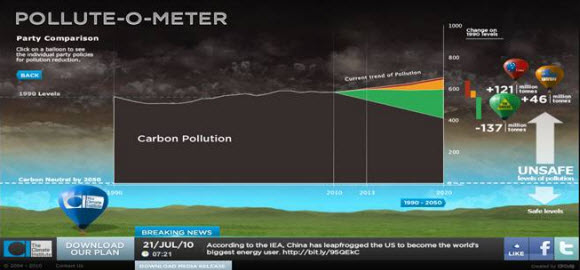After the 2007 election as we packed away the placards and the posters I thought one thing we’d be done with for sure was our Pollute-o-Meter, our innovative tracker of credible pollution reduction promises. Why we had bi-partisan support for an emissions trading scheme and we’d surely have that up with 2020 targets by next time … wrong!
So we had to go one better.
This time The Climate Institute and experts at Climate Risk have teamed to allow you to follow the ALP’s, Coalition’s and Greens’ pollution promise balloons. Sadly, for now at least, for the major parties that means ballooning pollution.
It took until the weekend for policies on cleaning up workplaces and cars, modest as they are, to shift the ALP’s policies from the business as usual baseline that sees pollution increasing 22% above 1990 levels by 2020. Until then for every step forward they had taken a step backward. The ALP is now on track to be 19%, or 121 million tonnes above 1990 levels by 2020.
And, as reported under our first analysis two weeks ago, the Coalition’s Emissions Reduction Fund does better at 8%, or 46 million tonnes, above.
In Crikey last week, Andrew Macintosh presented an excellent analysis of the chequered history of such funds, but the main point remains that both major parties will see pollution ballooning till 2020 and beyond under policies announced to date.
Only the Greens have sufficient policies, with limited international offsets, to achieve a 25% pollution reduction targets by 2020. It’s difficult to see how they’d deliver any more by then but they are committed to carbon neutrality by 2050.
The Pollute-o-Meter tool serves as a quantitative tracker while, as at last election, we also conduct a qualitative Five-Star Rating Analysis of policies. This has broader compass including contributions to build global agreements and ambition as well as support for research and development.
The ALP has clawed an extra half a star to sit at one and a half stars with policies on tax credits for greening up old commercial buildings and modest emissions standards for vehicles and power plants (although only partial points awarded for these). The ALP shows a relatively strong ranking on international policies but is let down by its refusal to put a timeline on a limit and price tag on pollution and the third tier nature of policies on offer to date.
The Coalition continues to rate poorly at half a star. It also fails to make businesses take responsibility for their pollution but is punished for plans to slash investments in building global ambition, making clean energy cheaper and small business support in The Carbon Trust.
The Greens’ far more comprehensive policies get them four stars.
This leaves us, if I can dangerously mix my metaphors, straddling a barbed wire fence when it comes to the major parties plans on pollution and climate change.
The ALP is ahead on policies, the Coalition on domestic pollution reduction. But neither have credible plans to achieve the up to 25% reductions they say they are committed to, let alone the 5% minimum reductions. Remember these are international commitments, the foreign policy implications of this credibility deficit are as yet unexplored by the media.
The Climate Institute will be doing a regular report for Crikey and will update its Pollute-o-Meter and Star Rating of policies within 24 hours of their announcement.
There’s plenty of room for improvement from both major parties in the remaining weeks. We need a limit and a price tag on pollution and credible commitments for pollution reduction, but there are still opportunities in land use, energy saving and cleaner energy policies.
With the Pollute-o-Meter and detailed analysis we hope to help you see through the hot air, past the phony ballast, towards a safer landing for our overly pollution dependent economy and its climate diplomacy.
John Connor is CEO of The Climate Institute.








The primary reason we don’t have an emissions trading scheme in place already is because the Greens cynically choice to play wedge politic instead of voting to support Labours package. They have shown they simply can not be trusted to compromise when it’s in the national interest
When the Greens voted down the ETS trying to push Labour to a Double Dissolution election in the hope this might provide them an opportunity to snaffle more Senate places, Bob Brown effectively became the Yasser Arafat of Australian Environmental Movement. The smart move would have been to get an ETS in place while the opportunity existed and then tweak it over time as people came to see it wasn’t the “economic armeggeddon” Tony and the Toorak Taliban have attempted to have us believe
Rest assured, should Tony Abbott’s Turramurra Tea Party actually pull off enough electoral smoke and mirrors to come up trumps on the big day, we’ll no doubt all be looking back in anger at Belligerent Bob Brown.